
#ItsYourMoneyNotTheirs
#ThankGodForTABOR
#VoteOnTaxesAndFees
#FeesAreTaxes
#TABOR
#FollowTheMoney
#FollowTheLaw
#UnlessLiberalsIgnoreTheConstitution

#ItsYourMoneyNotTheirs
#ThankGodForTABOR
#VoteOnTaxesAndFees
#FeesAreTaxes
#TABOR
#FollowTheMoney
#FollowTheLaw
#UnlessLiberalsIgnoreTheConstitution
Senate Bill 260, passed by Democrats in 2021, enacted new fees on gasoline purchases, deliveries and Uber and Lyft rides to raise billions for transportation projects

Colorado’s new transportation fees violate the Taxpayer’s Bill of Rights and several other state finance laws and should be invalidated, two conservative groups and Republican state Sen. Jerry Sonnenberg claim in a long-promised lawsuit filed late Thursday in Denver.
Senate Bill 260, passed by Democrats in the legislature last year, enacted a host of new transportation fees — including on gasoline purchases, deliveries and Uber and Lyft rides — to raise money for road and transit projects across the state.

In 2020, Colorado voters approved Proposition 116, which reduced the state’s income tax rate from 4.63 to 4.55 percent. Due to the state’s application of certain provisions of TABOR, however, taxpayers will effectively lose out on the rate reduction for the first several years.
Naturally, voters expected that Proposition 116 would allow them to keep more of their own money. A close look at documents maintained by Legislative Council Staff (LCS), however, reveals that things did not work out how voters expected. Tax rates went down, but constitutionally mandated tax refunds — known as “TABOR refunds” — fell by the exact same amount, negating taxpayer savings from the voter-approved tax cut.
It’s a bit complicated, but here’s how it works.
Article X of the state constitution — commonly known as the Taxpayer’s Bill of Rights, or TABOR — sets limits on the amount of tax revenue the state can collect each year. If revenues, including income-tax collections, surpass the TABOR limit, the excess gets refunded back to voters.
Picture state coffers as a silo and revenues as grain filling it up. In a good year, there may be more bounty than what the silo can hold. In that case, the overflow goes back to the people.
Each year, the limit — or the size of the silo — increases based on population growth and inflation, allowing government spending to grow automatically. If the state wants to collect or keep tax monies at a level higher than automatic growth permits, it must win voter consent at the ballot.
When voters reduced revenues last year, they voted to decrease the amount of grain put into the silo by a specified amount. In executing the will of the people, the state reduced the amount of grain but put it in the same, larger silo. At the lower income-tax rates, the harvest (i.e. revenues) would have to be exceptionally good to fill up the same silo and trigger a refund.
Incidentally, state revenue forecasts show very bountiful times ahead and refunds for at least four consecutive years despite all this. That means that for at least this year and the next three, smaller refunds will offset the voter-approved tax cuts unless additional reforms are adopted.
Read plainly, TABOR appears to guard against this outcome by requiring the limit to be “adjusted for revenue changes approved by voters.” LCS evidently has a different interpretation—one which has effectively stripped voters of their tax cut.
Governor Jared Polis has lauded the income tax cut on multiple occasions and even said that he supports eliminating the state income tax entirely. He can demonstrate fidelity to his own rhetoric and to the state constitution by directing the Colorado Department of Revenue to adjust the TABOR limit for the “revenue changes approved by voters” with Proposition 116. Alternatively, the General Assembly could set a new, lower TABOR limit to reflect the new tax rate. Either solution would cause voters to receive their full refunds and benefit from the income tax reduction they adopted in 2020.
Ben Murrey, Fiscal Policy Center Director with the Independence Institute
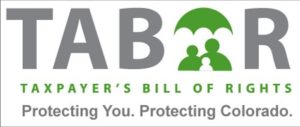
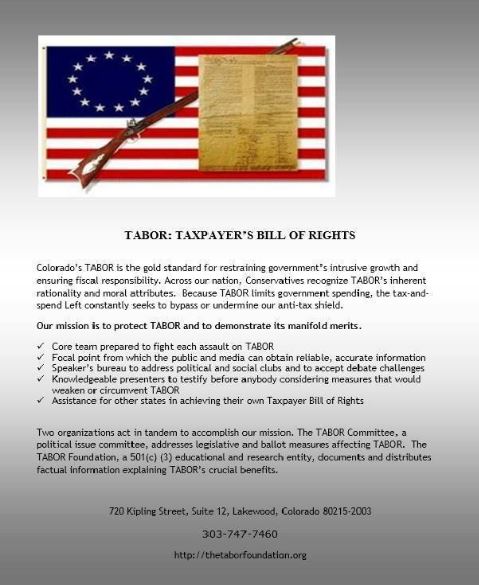
DENVER — Legislative Democrats are poised to kill a Republican effort to increase transparency for their constituents where fees and spending are concerned.
While Colorado Democrats and Governor Jared Polis continue to tout new state and federal regulations that went into effect Jan. 1 requiring all emergency medical costs to be disclosed before a patient is treated, an opaque charge collected on hospital stays, passed under previous Democrat legislation isn’t getting the same reception.
The fallout is leading two GOP lawmakers to call foul on their Democrat counterparts for not requiring government to follow the same transparency rules they force private industry into.
Senate Bill 22-038, the “Healthcare Affordability and Sustainability Fee,” sponsored by Sen. Jerry Sonnenberg, R-Sterling has been assigned to the State Veterans & Military Affairs Committee, where ideas that majority Democrats don’t agree with go to die.
It’s dubbed the “kill committee” because it’s where Senate leadership sends bills it doesn’t want debated among all the senators on the floor.
Click (HERE) to continue reading this story
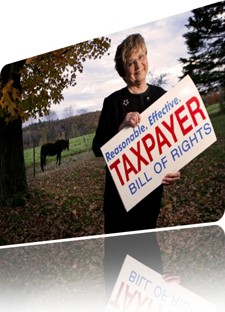
#ItsYourMoneyNotTheirs
#ThankGodForTABOR
#VoteOnTaxesAndFees
#TABOR
#FollowTheMoney
#FollowTheLaw
#UnlessLiberalsIgnoreTheLaw
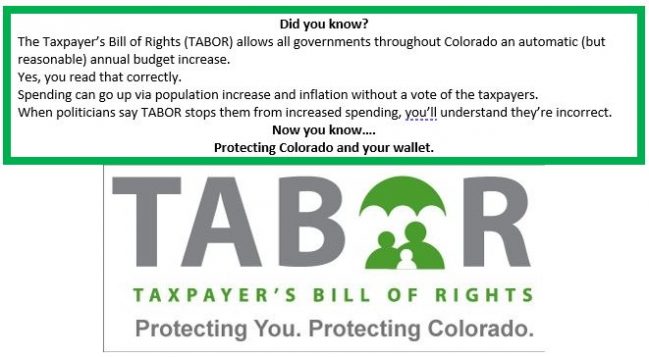
#ItsYourMoneyNotTheirs
#ThankGodForTABOR
#VoteOnTaxesAndFees
#TABOR
#FollowTheMoney
#FollowTheLaw
#UnlessLiberalsIgnoreTheLaw

The TABOR Committee urges a YES vote on Proposition 120, “Property Tax Assessment Rate Reduction.”
The proposal would put into law the assessed values for residential and commercial property for purposes of calculating annual property taxes. It would lower the calculated tax burden by about $1 Billion.
The repeal of the Gallagher Amendment was argued as a way to simplify the tax system and make it more rational. It also resulted in higher expected property taxes. This proposal reduces the expected property taxes. After the measure qualified for the ballot, the legislature acted to thwart the will of the people by passing a bill which vastly reduced the effect. Voting for the measure will certainly lead to a necessary legal challenge, based on the standing legal theory that the most recent change in statute (the passage of the Proposition) becomes the new controlling law. Not only is this measure’s underlying tax reform a good idea, but the fall-out will be critical in preventing future legislators from denying the people the right of the initiative through dishonest subterfuge.
#ItsYourMoneyNotTheirs
#ThankGodForTABOR
#VoteOnTaxesAndFees
#TABOR
#FollowTheMoney
#FollowTheLaw
#UnlessLiberalsIgnoreTheLaw
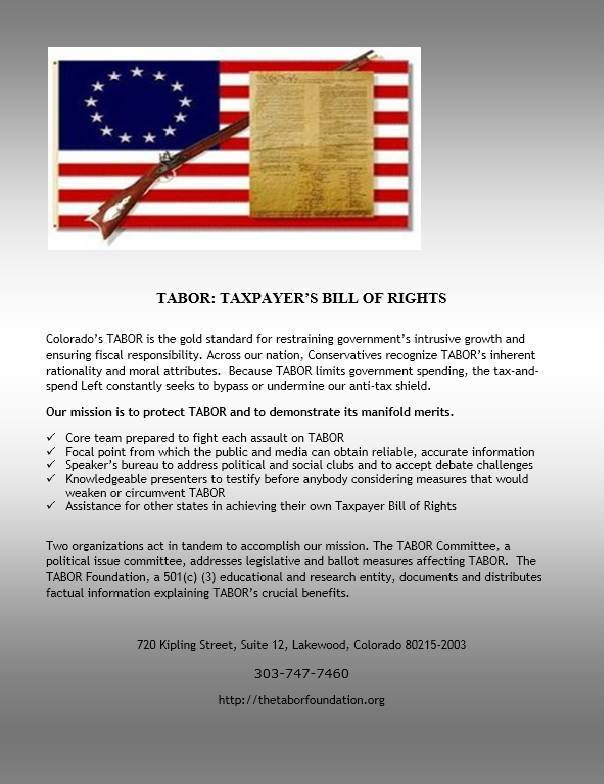
The TABOR Committee urges a NO vote on Proposition 119, “Learning Enrichment and Academic Progress Program.”
The initiated measure would change state law to increase taxes by $137.6 Million on marijuana. Proceeds would go to a new program and agency to fund K-12 after-school activities.
That this concept includes voucher-like opportunities is a good, but insufficient reason to support the measure. Yet another new centralized state government program is unlikely to solve the problems, will have a significant administrative burden and necessarily get bogged down in red tape, funding too much bureaucracy and too little programming. Additionally, ever-higher taxes on marijuana will encourage the lower-cost, criminal underground market for pot.
#ItsYourMoneyNotTheirs
#ThankGodForTABOR
#VoteOnTaxesAndFees
#TABOR
#FollowTheMoney
#FollowTheLaw
#UnlessLiberalsIgnoreTheLaw

The TABOR Committee urges a YES vote on Amendment 78, “Legislative Authority for Spending State Money”
This constitutional amendment respects the separation of powers by putting the General Assembly into the process of appropriating revenues received by the state government. As the system works now, only the Executive branch (Governor and his appointed agencies) determine how federal grants, like COVID relief funds or money from legal settlements, are spent.
The legislative process allows for public comment and input, which is absent under the current system. Passage of this measure would put that process in place, respecting an intent of the Taxpayer’s Bill of Rights. The TABOR Committee is also alarmed that so much power is currently in the hands of one person, which violates one of the founding principles of American governance. Some concern exists that taxes currently counted toward the TABOR annual limitation will be made exempt, but the Committee was unable to identify any. Therefore we endorse the proposed measure for respecting the proper separation of powers.
